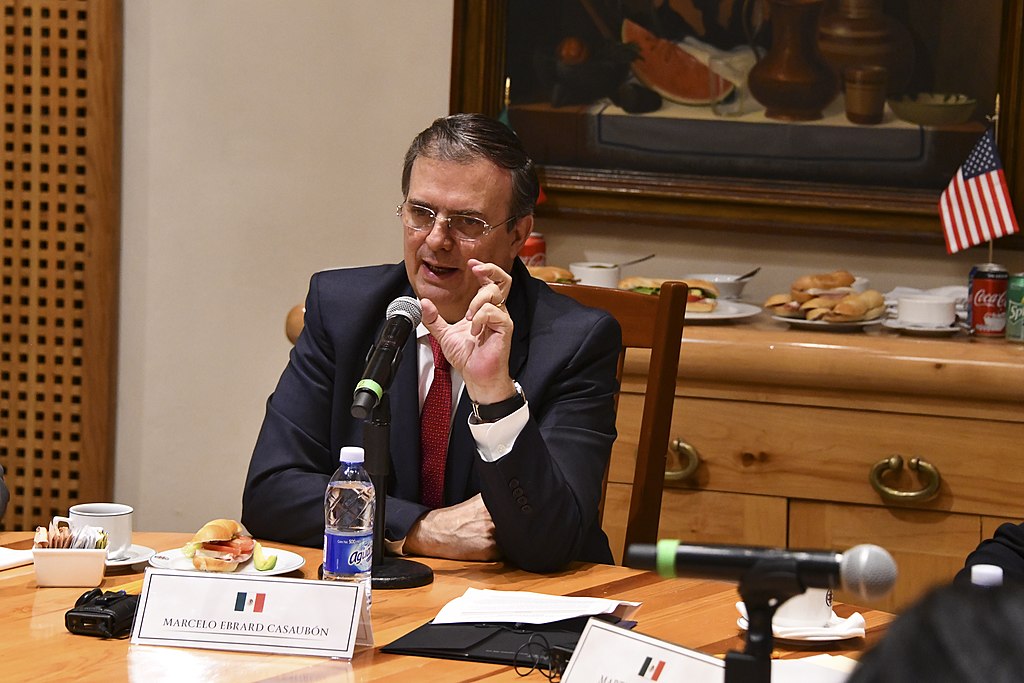Mexican officials expressed optimism about reaching an agreement with the U.S. before threatened tariffs take effect. President Donald Trump delayed imposing 25% tariffs on Mexico and Canada for a month, demanding stronger action on drug trafficking and illegal immigration.
Economy Minister Marcelo Ebrard stated that one month is sufficient for negotiations, emphasizing a more balanced dialogue. Foreign Minister Juan Ramon de la Fuente highlighted Mexico’s commitment to collaboration, noting shared concerns with the U.S.
To show progress, Mexico deployed 10,000 National Guard troops to its northern border. President Claudia Sheinbaum’s diplomatic approach to Trump’s threats has been widely praised. Unlike Canadian Prime Minister Justin Trudeau, who had to negotiate through two calls, Sheinbaum secured a delay in one conversation.
Mexico plans to raise key issues in upcoming talks, including the trafficking of U.S. firearms into Mexico. Ebrard emphasized that while fentanyl smuggling is a focus, arms smuggling also fuels cartel violence. Mexico has sued U.S. gunmakers over the issue.
Additionally, Mexico aims to discuss auto manufacturing, as U.S. automakers heavily rely on cross-border trade. Tariffs could disrupt supply chains and drive up consumer costs.
Both countries recognize that cooperation is vital for addressing migration, security, and trade. Mexican officials remain confident that a deal can be reached to prevent economic repercussions.



 Nighttime Shelling Causes Serious Damage in Russia’s Belgorod Region Near Ukraine Border
Nighttime Shelling Causes Serious Damage in Russia’s Belgorod Region Near Ukraine Border  U.S. to Begin Paying UN Dues as Financial Crisis Spurs Push for Reforms
U.S. to Begin Paying UN Dues as Financial Crisis Spurs Push for Reforms  Trump Signs “America First Arms Transfer Strategy” to Prioritize U.S. Weapons Sales
Trump Signs “America First Arms Transfer Strategy” to Prioritize U.S. Weapons Sales  China Warns US Arms Sales to Taiwan Could Disrupt Trump’s Planned Visit
China Warns US Arms Sales to Taiwan Could Disrupt Trump’s Planned Visit  New York Legalizes Medical Aid in Dying for Terminally Ill Patients
New York Legalizes Medical Aid in Dying for Terminally Ill Patients  Trump Signs Executive Order Threatening 25% Tariffs on Countries Trading With Iran
Trump Signs Executive Order Threatening 25% Tariffs on Countries Trading With Iran  India–U.S. Interim Trade Pact Cuts Auto Tariffs but Leaves Tesla Out
India–U.S. Interim Trade Pact Cuts Auto Tariffs but Leaves Tesla Out  South Korea Assures U.S. on Trade Deal Commitments Amid Tariff Concerns
South Korea Assures U.S. on Trade Deal Commitments Amid Tariff Concerns  U.S. Lawmakers to Review Unredacted Jeffrey Epstein DOJ Files Starting Monday
U.S. Lawmakers to Review Unredacted Jeffrey Epstein DOJ Files Starting Monday  U.S.-India Trade Framework Signals Major Shift in Tariffs, Energy, and Supply Chains
U.S.-India Trade Framework Signals Major Shift in Tariffs, Energy, and Supply Chains  TrumpRx Website Launches to Offer Discounted Prescription Drugs for Cash-Paying Americans
TrumpRx Website Launches to Offer Discounted Prescription Drugs for Cash-Paying Americans  Federal Judge Restores Funding for Gateway Rail Tunnel Project
Federal Judge Restores Funding for Gateway Rail Tunnel Project  Japan Election 2026: Sanae Takaichi Poised for Landslide Win Despite Record Snowfall
Japan Election 2026: Sanae Takaichi Poised for Landslide Win Despite Record Snowfall  Ohio Man Indicted for Alleged Threat Against Vice President JD Vance, Faces Additional Federal Charges
Ohio Man Indicted for Alleged Threat Against Vice President JD Vance, Faces Additional Federal Charges  Trump Says “Very Good Talks” Underway on Russia-Ukraine War as Peace Efforts Continue
Trump Says “Very Good Talks” Underway on Russia-Ukraine War as Peace Efforts Continue  Trump Backs Nexstar–Tegna Merger Amid Shifting U.S. Media Landscape
Trump Backs Nexstar–Tegna Merger Amid Shifting U.S. Media Landscape  Iran–U.S. Nuclear Talks in Oman Face Major Hurdles Amid Rising Regional Tensions
Iran–U.S. Nuclear Talks in Oman Face Major Hurdles Amid Rising Regional Tensions 































